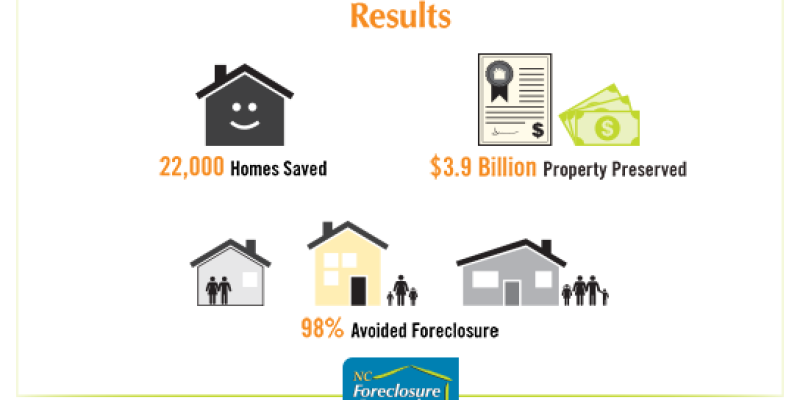
RALEIGH - North Carolina homeowners struggling to pay their mortgages because of job loss, reduction in income or other temporary hardships can still get help through the N.C. Foreclosure Prevention Fund thanks to an additional $224 million in funding. The funds were awarded last week to the North Carolina Housing Finance Agency, which administers the program, from the U.S. Department of the Treasury’s Hardest Hit Fund®.
Launched in December 2010, the N.C. Foreclosure Prevention Fund has helped nearly 22,000 North Carolina homeowners who have experienced certain financial hardships keep their homes while they look for work or complete job training. The program was expanded in 2013 to assist returning veterans who are transitioning to civilian jobs. The Fund also now provides assistance for homeowners who have secured employment after a financial hardship but are earning less and unable to pay their mortgage as a result.
“This additional funding from the U.S. Department of the Treasury is a testament to just how successful this program has been in the state,” said A. Robert Kucab, executive director of the N.C. Housing Finance Agency. “So far, we have helped nearly 22,000 North Carolina homeowners keep their homes, and with this additional funding, we expect to help thousands more and to continue our special outreach to returning veterans.
“The impact of this program on the state’s economy has also been profound, saving $3.9 billion in property value to date. By reducing the number of foreclosures, the effort will continue to help stabilize property values in communities across the state.”
The Fund makes mortgage payments for North Carolinians who have lost jobs through no fault of their own while they seek employment or complete job training in a new field. Others who have gotten behind on their mortgage payments because of divorce, illness or other temporary hardship may qualify for help while they seek jobs to get back on their feet.
The mortgage payment assistance is provided as a zero-interest, deferred loan of up to $36,000, or 36 months of mortgage-related payments. Homeowners will resume making their own mortgage payments at the end of the loan period.
The Fund also can assist homeowners who are re-employed after a qualified hardship but earning less than before and unable to afford their mortgages by reducing their principal balance with a no-interest deferred loan. The mortgage loan is then recast to make the payments more affordable.
If the owner continues to live in the home for 10 years, the loan will be considered forgiven and no repayment will be due.
“Although the unemployment rate has improved and now stands at 5.5%, the number of North Carolinians who have found new employment but are underemployed and still unable to afford their mortgages is higher than anyone wants to see,” Kucab said. “The North Carolina Foreclosure Prevention Fund can help these individuals recover from a financial crisis that is out of their control.”
To be eligible, homeowners must have a good mortgage payment history prior to the qualifying job loss or financial hardship event, be able to resume their mortgage payments once the assistance ends and meet other program guidelines.
This assistance is available statewide through participating HUD-approved counseling agencies. For more information about their eligibility, homeowners should call a participating agency or the information line, 1-888-623-8631.
The Treasury’s Hardest Hit Fund® was authorized under the Emergency Economic Stabilization Act of 2008. It is available to states which have experienced high unemployment or a steep decline in property values. North Carolina was selected because of the large percentage of the population living in counties with high unemployment rates in 2009.
The North Carolina Housing Finance Agency, a self-supporting public agency, has financed 242,000 homes and apartments since its creation in 1973.The North Carolina Foreclosure Prevention Fund has helped nearly 22,000 homeowners avoid foreclosure.